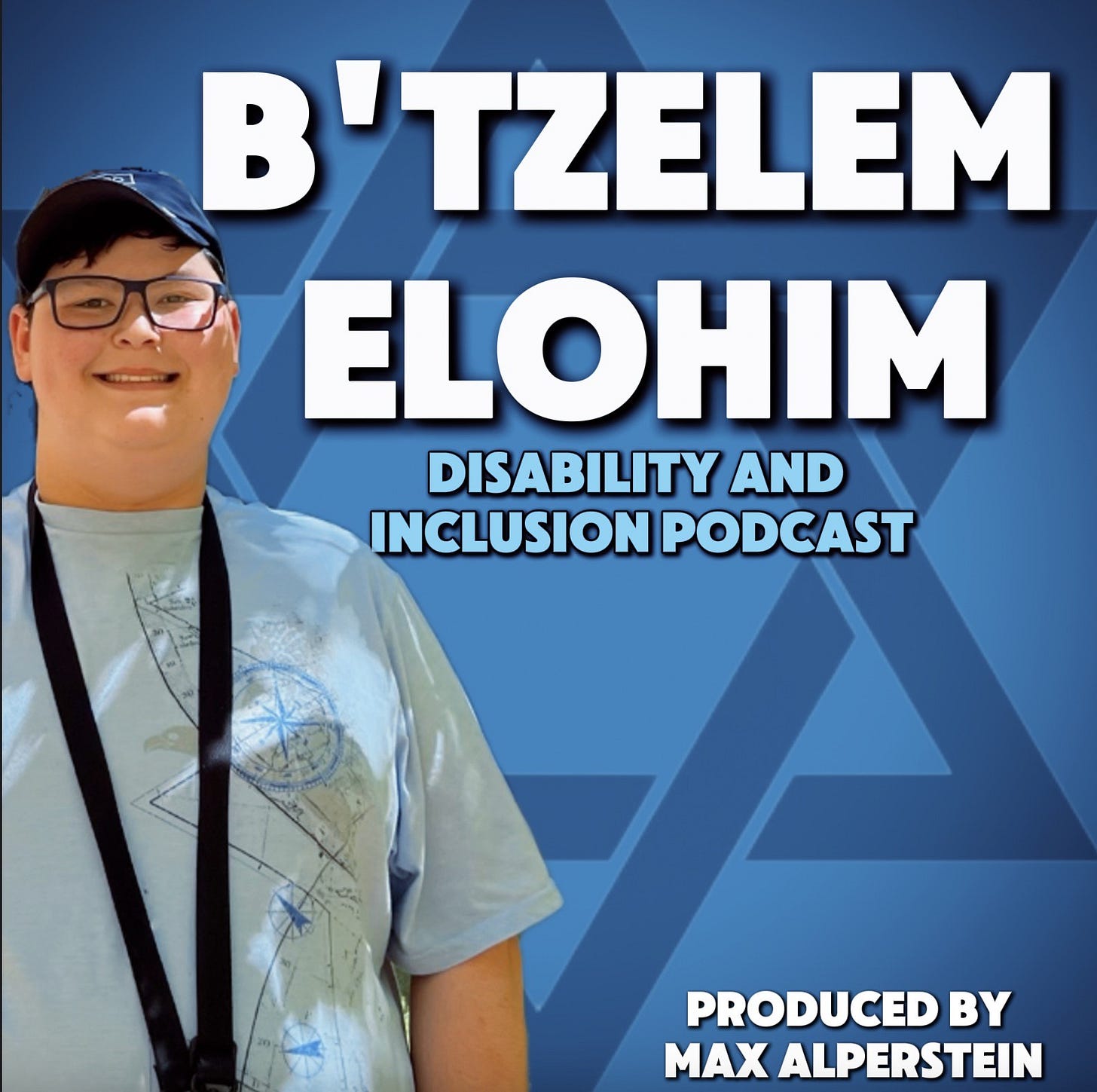B'Tzelem Elohim Podcast, Episode Five: Cortney Kuperman and A Tale of Three Shabbats
by Rafi Josselson
Editor’s Note: Check out Rafi’s podcast and new blog ‘A Tale of Three Shabbats’ below it.
In this episode, Rafi talks with Cortney Kuperman about their work together at Camp Ramah in Nyack as part of the disability staff program. Rafi and Cortney emphasize the importance of self-advocacy, flexibility, and disabled young adults transitioning into the workplace.
A Tale of Three Shabbats
My weeks are busy. So, when I am asked, “How do you manage it?” I answer with Shabbat. I have no responsibilities, just time to eat, pray, read, and relax. But, that was different in November. Instead, I had three back-to-back Shabbats away from home. Each was different but gave me important takeaways that have helped me understand my neurodiversity and the neurodiversity of others more. And because I want to, each story will be titled after a Beatles song.
Story One: Get Back
My first Shabbat away was the most overwhelming. I am in my second year of the Hartman Teen Fellowship, a program designed for Jewish teens interested in understanding the major ideas behind Jewish civilization. Part of the fellowship includes two Shabbatons (a weekend-long Shabbat gathering), one in the fall and one in the spring. Having experienced two Shabbatons previously, I didn’t think too much about this one. I decided to go to school in the morning of the Shabbaton instead of relaxing. Big mistake. I was stressed about schoolwork in the morning. Trying to transition from my stressful school environment to a socially and sensory overwhelming Shabbaton was not sustainable. I didn’t have the battery or energy to handle the first day of the Shabbaton. My brain was off. As I have learned again and again, listening to my body is important. I considered my options, and did something I didn’t want to do – I went home before the program began.
But that wasn’t the end of the Shabbaton. I had flexibility —the ability to “get back.” Getting ready for the next step in my life, I know that taking a break is going to be one of the most useful tools available to me, but I can’t let a break prevent me from returning to a program. On Saturday morning I was nervous about returning. I was worried that it would be awkward, complicated, and frowned upon. I was wrong. I was lucky that the staff, faculty, and other participants in the program were understanding. I ended up having a wonderful time – the classes engaged me, I got to catch up with some friends from the previous year and I even got to make babka. I’ll certainly keep this experience in the back of my mind.
Story Two: Come Together
For the next Shabbat, I was the focal point - I was the Scholar in Residence at the Hebrew Institute of Riverdale, the Bayit, where I spoke and taught about the value of disability inclusion. By this point, I have done many presentations. Walking into an unknown synagogue with mostly unknown people and staying in an unknown city with family friends that I was close to but whose house I had never visited before wasn’t as daunting as I thought it would be. While the previous Shabbat was challenging energy-wise, this Shabbat was easy through and through.
This Shabbat left me reflecting on the work that I do.
I get these deep moments from time to time. I think the most notable one being when I learned about Danny Klein (more about Danny on my blog post: Inclusion Saves Lives). But this time was different. I was able to see in the moment how my presentation touched people. While I typically focus on what individuals in a community can do to include, I don’t often touch upon the toll and effort that relatives (especially parents) must undertake to get their children the support that they need. All of these people opened up not only about the struggles they faced but also about the joy their neurodivergent relatives brought into their lives. My mom was there on Shabbat afternoon. She described it to me as a much-needed forum that could very well lead to the creation of a support group. While their experiences certainly diverged from my own, it reminded me that while large-scale change is important, it is the effort of individuals, especially close friends and family to best support a neurodivergent individual.
Story Three: With a Little Help from My Friends
I concluded my Shabbat journey the next week on my grade-wide Shabbaton. And for me, the whole experience encapsulates something I’ll be doing all year: awesome reflection.
In ninth grade, in a blog for MATAN, I wrote about my freshman Shabbaton experience, We were split into bunks when we arrived, but I didn’t know the kids in the bunk, and I didn’t feel very comfortable. I started to worry that it would be difficult to connect with them. I had a panic attack, and after what felt like an eternity to me, I was able to explain how I was feeling to an administrator. I was moved to another bunk where I knew some kids and over the weekend, found others who have similar interests as me. It turned out to be the best decision I could have made. The weekend was long and full of services, activities, and meals. But I made some new friends, and I came home from the Shabbaton feeling more confident about socializing and meeting new people.
Now, here is what my experience was like this time, 3 years later.
I was in a room with some of my closest friends. I immediately felt comfortable, and in the morning I had a deep conversation with one of my friends about how we were doing and our plans for the rest of the year. We had woken up early so we must have been talking for at least two hours when we were finally “woken up.” Downstairs we did fun activities – Leffell Family Feud, where I was second most likely to win a Nobel prize and return as Leffell’s principal. I also participated in ‘mafia’ and a game of Apples-to-Apples, where I was the winner.
I was also a leader. We had a long programming, tefillot, that I had helped plan and run. On Friday night I took part in one of the most meaningful moments of my life, a tisch full of songs and memory sharing. And, when I got a sensory overload on the bus on Saturday night, a student quieted down the other students so that I could recenter myself.
What a difference! Comparing the two Shabbatons - not only do I have a reliable support system with administrators, but in fact, my strongest supports are my classmates. They know me. They care about me. And they are ready to help. On my end, I have become more socially confident. My mantra is “I’ll try.” Weeks later during “Zen Week” I participated in our grade-wide karaoke. For me, this seemed inconceivable four years ago, but now it is not only reality but my everyday experience. To be in a place where everyone knows your name, you feel comfortable and you feel supported, is truly unique. To the other people out there beginning a transition – know that if it has a warm and supportive culture you’ll find your place. I certainly have.
Rafi Josselson is an autistic senior at the Leffell School in Westchester County. Rafi has spoken at multiple places across the Northeast including; Solomon Schechter Day School of Bergen County, Temple Israel Center, and, the Charles E. Smith Jewish Day School. He also has written blogs for MATAN, for his website, and for Jewish Disability Inclusion News. He is also excited to announce the launching of the first-ever Jewish Disability Podcast: B'tzelem Elohim. Rafi hopes to spread a message of Empathy, Inclusion, Awareness, and, Acceptance through his work. Outside of Autism Advocacy; Rafi is the co-president of his shul’s USY Chapter, a regular Torah reader and tefillah leader at synagogue and school, including as the 12th-grade student tefillah coordinator, a Hartman Teen Fellow, a counselor at Ramah Day Camp in Nyack, a managing editor for his school’s newspaper, and, an avid reader of both books and the news.





